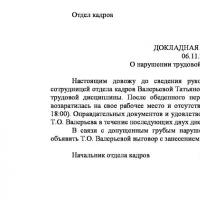Letter to colleagues upon dismissal from work
They are not yet as widespread in Russia as in the West, where they have become an integral part of corporate culture. Their writing has not yet become a general rule, and it is certainly not necessary to do so. And yet they are becoming more widespread.
Depending on the situation, a farewell letter is composed in different ways: relations with colleagues can be of varying degrees of intimacy, and, in addition to dismissal, sometimes the reason for writing is transfer to another department within the company, and so on. In order to compose a letter correctly, let's get acquainted with how to do it, what the form and content of such a letter can be, who should be sent to.
To some, this practice may seem unusual and questionable. This is not surprising, because in our country it is new, and in general our corporate culture is just developing, and it seems strange to send a letter to such a large number of people when at work we usually communicate with only a small part of them.
Of course, no one will make it compose, because it is not necessary, but nevertheless it becomes an important rule of good form. Therefore, for a corporate employee who wants to maintain a high opinion of others about himself, it is important to be able to properly leave work, especially since recommendations may be required in the future. And writing a farewell letter is becoming an increasingly important part of leaving.

Psychologists also recommend writing farewell letters: they will help you summarize your inner work, draw conclusions and streamline your thoughts, and then approach the next challenges that have already been updated. This will help you once again remember what kind of relationship you have developed with colleagues and bosses, what you did right and what did not, and not make mistakes at the next place of work. In addition, in any case, stress, and sending letters will be an additional guarantee against getting into an awkward situation with a personal goodbye. After all, not everyone wants to communicate.
At the same time, the message, in addition to the above, also has purely utilitarian tasks - it conveys information about your dismissal and new place of work, which can help in maintaining business contacts in the future. If you are familiar with someone who comes to your place and want to recommend him - it is also worth doing that.
How to write a farewell letter: form and content
Regardless of the form in which the message is composed, it is important to structure it in such a way that it is easy to understand and can be read quickly.
The simplicity and clarity of the text are top priorities, and the content should be aware of yours.
This may be followed by a story about motives and about a successor. But both are optional.

Although the reason is informing colleagues about the dismissal, the most important part of the letter is undoubtedly the words of gratitude, which will help to leave a pleasant impression of yourself. This means that thoughts should be expressed positively and not get carried away with analyzing the reasons for leaving and criticizing the company. And what absolutely absolutely cannot be done is to state conjectures and get personal. You should not allow negative emotions to splash out into the text of the letter, otherwise the effect will be exactly the opposite of what was intended, and you will not present yourself in the best light among your colleagues.
Both just good wishes and parting words and their expression in a creative form will help to make a good impression - it is often customary to design such messages with humor so that colleagues can laugh at last, irony, especially self-irony, is welcome. Although no one forces you to invent something special, and a farewell letter upon dismissal can be drawn up in a standard style. And even if it is carried out in an informal or humorous manner, you should still refrain from being rude to colleagues - even if they seem friendly to you, it is worth remembering that the message is addressed to the team, and its members may interpret some of the wording in different ways.
The style may also depend on. So, if you still want to express your dissatisfaction, it is permissible to do it in a farewell message - as psychologists point out, this is one of the ways to reduce stress. And yet it is important not to slip into insults, but to clothe the negative in a clear constructive form and, with all efforts to express carefully, it is unlikely in this case that one should count on good relations with ex-colleagues in the future. This farewell letter is no longer intended for the team, but for the quitting employee himself. However, if you do not find the strength in yourself to write a positive message that could cheer you up, or do not consider it necessary to do so, it is better to limit yourself to standard writing or even its abbreviated form - without emotions.
Should you send a farewell letter to your boss?
A separate letter can be written for the boss.
If you took up writing a letter for colleagues, then it is highly desirable to draw up a separate message to your boss, because this will emphasize respectful attitude, even if in fact you had a conflict with him. Moreover, a farewell letter is an appropriate way to admit mistakes and resolve a conflict, and thus leave more positive memories about yourself than they would have been without it. Who knows - what if this will play a role in the future?

Of course, it is easier to write a farewell message to colleagues than to a boss, especially if the relationship with them was not cloudless, and even more so if the dismissal is somehow connected with him. However, it is an important way to emphasize professionalism that should not be neglected.
A letter to the boss should differ from a message to colleagues in terms of content: for example, if there are many different ways to address colleagues, including informal ones, but in a letter to the boss it is still important to clearly maintain the chain of command and write it in a strict style. As a rule, the text expresses gratitude for the assistance and all kinds of support, help in improving skills: even if in fact you do not feel it and do not think that your boss has helped you, you should maintain the most benevolent tone. If you can illustrate the words of support with a concrete example, it is worthwhile to do so, so that the letter will become more meaningful.
It should also be emphasized that you have learned a lot and become more experienced thanks to his leadership, list the merits and positive qualities that you would like to have as well. The application form is personal, sending the same letter to the boss as to the rest of the colleagues is a mistake.
Examples of farewell letters to colleagues

Of course, there is no strict, clearly established and officially approved sample - after all, the letter itself is unofficial. Still, you can highlight general rules and give examples.
First, we briefly outline the main parts of the letter and summarize the rules for their writing:
- The form of addressing colleagues should be polite, for example, "respected colleagues". However, as will be shown in the examples, sometimes it is possible to retreat from this - with the appropriate atmosphere in the team.
- After contacting them, you need to inform them about the fact of your departure from work - if a successor is known, then his name is also indicated here. You can talk about the reasons for the dismissal - but not necessarily.
- This is followed by thanks and wishes to colleagues - usually work-related.
- Also, there can be suggestions for the future to improve teamwork - but this is rarely done, and, of course, in the most gentle and friendly manner. Still, a farewell letter is not a very appropriate place for criticism.

 A ready-made business plan with calculations using the example of a web studio
A ready-made business plan with calculations using the example of a web studio Registration of an internal memo: a sample document and rules for drawing up
Registration of an internal memo: a sample document and rules for drawing up Break even. Formula. An example of calculating a model in Excel. Advantages and disadvantages
Break even. Formula. An example of calculating a model in Excel. Advantages and disadvantages Advance Statement is ... Advance Statement: Sample Filling
Advance Statement is ... Advance Statement: Sample Filling How to sew documents by hand with threads correctly?
How to sew documents by hand with threads correctly? Disciplinary Action for Failure to Perform Official Duties
Disciplinary Action for Failure to Perform Official Duties Binding your book
Binding your book